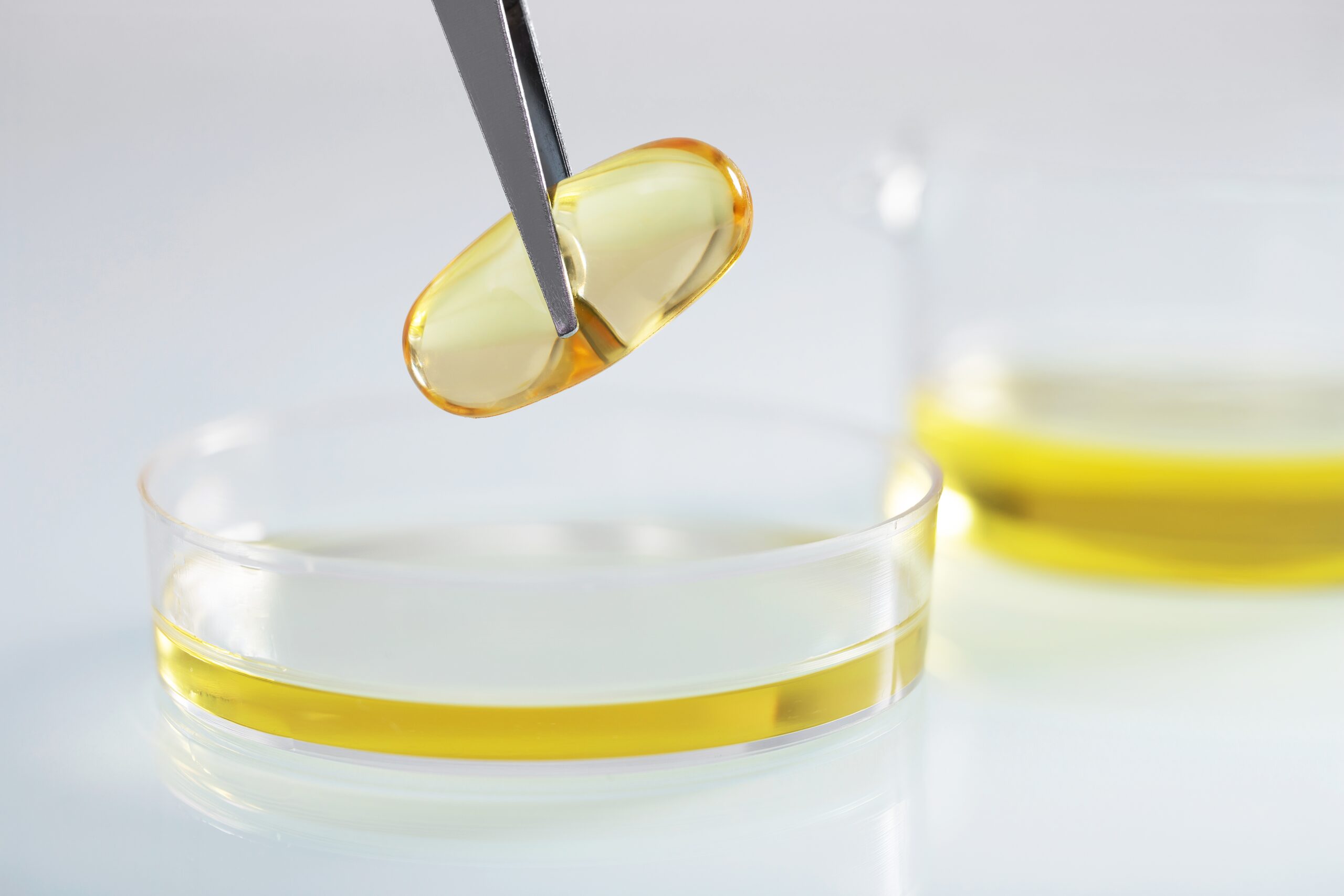Vitamin A is an essential component of many processes in the human body. It is in the group of fat-soluble vitamins. Without it, many biochemical processes, such as the metabolism of proteins or steroid hormones, would be impossible. The active form of vitamin A is retinol, which:
The properties of vitamin A make it possible to form rhodopsin. It is a substance that enables good vision. Vitamin A also participates in building![]() the body's natural immunity by supporting the immune system. Furthermore, the utilization of vitamin A in cosmetics has been attributed to its ability to enhance the overall quality and appearance of the skin. However, pregnant women should be careful with its dosage because it has a teratogenic effect.
the body's natural immunity by supporting the immune system. Furthermore, the utilization of vitamin A in cosmetics has been attributed to its ability to enhance the overall quality and appearance of the skin. However, pregnant women should be careful with its dosage because it has a teratogenic effect.
Vitamin A performs various significant functions in the body. Among other things, it participates in protein synthesis and fat metabolism. It accelerates the regeneration of cells. Furthermore, vitamin A plays a crucial role in supporting growth processes. Notably, it has been found to possess anti-cancer properties. making it an essential nutrient for overall health.
One of the most important functions of vitamin A is participation in the functioning of the eyesight by producing nerve impulses in the retina under the influence of light. Thanks to this, it is possible to receive light stimuli and convert them into an image in the appropriate structures of the brain. It helps keep the proper vision process![]() . One of the most characteristic symptoms is night blindness, which is caused directly by the deficiency of rhodopsin.
. One of the most characteristic symptoms is night blindness, which is caused directly by the deficiency of rhodopsin.

Vitamin A plays a crucial role in maintaining healthy skin. It helps to renew the epidermis, making it stronger and more resistant to water loss. Additionally, Vitamin A boosts the production of collagen and elastin, which are essential proteins for building healthy skin cells. An additional benefit of its use is the elimination of discoloration and fine wrinkles. Thanks to these properties, vitamin A is one of the most effective ingredients in anti-aging![]() preparations.
preparations.
It directly affects the elasticity, firmness, and hydration of the skin. Vitamin A derivatives, retinoids, are often used in the treatment of acne![]() . In addition, beta-carotene, or provitamin A, is an additional “sunscreen” that reduces sensitivity to UV radiation, and thus the risk of sunburn.
. In addition, beta-carotene, or provitamin A, is an additional “sunscreen” that reduces sensitivity to UV radiation, and thus the risk of sunburn.
Testing the concentration of vitamin A![]() in the body is recommended for people who suspect that they may suffer from a deficiency or excess of this vitamin. These conditions are called hypo- and hypervitaminosis, respectively. Each of these disorders is characterized by a separate set of clinical symptoms and is associated with the risk of developing specific health complications.
in the body is recommended for people who suspect that they may suffer from a deficiency or excess of this vitamin. These conditions are called hypo- and hypervitaminosis, respectively. Each of these disorders is characterized by a separate set of clinical symptoms and is associated with the risk of developing specific health complications.
Due to the influence of vitamin A on the proper development of the fetus, it is also significant that women who are planning and pregnant take care of maintaining the correct concentrations of this substance in the body. In addition, the determination of vitamin A levels should be performed before and during supplementation to assess the effectiveness of the implemented treatment.
Vitamin A deficiency![]() causes serious health consequences. It may result from an insufficient supply of vitamin A in food or from disorders in its metabolism in the body – then it is analogously referred to as a primary or secondary deficiency.
causes serious health consequences. It may result from an insufficient supply of vitamin A in food or from disorders in its metabolism in the body – then it is analogously referred to as a primary or secondary deficiency.
Primary vitamin A deficiency![]() usually results from prolonged intake of insufficient amounts of vitamin A or carotenoids in food. In certain regions of South and East Asia, primary deficiencies pose a major concern due to rice being the primary food source lacking carotene.
usually results from prolonged intake of insufficient amounts of vitamin A or carotenoids in food. In certain regions of South and East Asia, primary deficiencies pose a major concern due to rice being the primary food source lacking carotene.
We obtain vitamin A from food, hence the most common causes of its deficiency include too low intake and disorders of its absorption in the intestines. A lack of vitamin A may occur due to an insufficient intake of vitamin A-rich foods (as mentioned above) or due to inadequate nutrition. The state of deficiency may occur in the case of increased demand for vitamin A, like in children suffering from measles.
The causes of vitamin A deficiency include several factors affecting the supply, absorption, and metabolism of this compound. Here you can mention, among others:
Secondary deficiency![]() most often results from metabolic disorders in the body, as a result of which the body is unable to assimilate, store or produce vitamin A. In such situations, despite the sufficient supply of vitamin A and its precursors in the diet, symptoms, and effects of deficiency appear in the body.
most often results from metabolic disorders in the body, as a result of which the body is unable to assimilate, store or produce vitamin A. In such situations, despite the sufficient supply of vitamin A and its precursors in the diet, symptoms, and effects of deficiency appear in the body.
Absorption and storage disorders are likely to occur:
Secondary vitamin A deficiency often accompanies protein-energy malnutrition, not only as a result of an insufficient supply of food but also due to impaired storage and transport of vitamins in the body.
Currently, vitamin A deficiency is rare in the so-called developed countries, however, the possibility of the emergence of this disease syndrome should always be taken into account, especially in the case of the coexistence of eating disorders and other diseases affecting the function of the digestive system.
These are the most typical signs of a vitamin A deficiency![]() :
:

Long-term vitamin A deficiency significantly impairs the patient's quality of life. They are especially dangerous among the youngest age group, as it is children who are most at risk of serious complications related to too low levels of vitamin A. Vitamin A deficiency increases the frequency of diarrhea, which in pediatric patients leads to electrolyte disturbances and extreme, life-threatening dehydration. In addition, vitamin A deficiencies may result in impaired development of the skeletal system, growth retardation, and permanent damage to the eyesight, which can lead to complete blindness.
Yes, just like with deficiencies, an excess of vitamin A is not good for the human body. This usually happens when vitamin A is taken improperly through supplementation or over-the-counter dietary preparations.
To avoid health complications associated with it, it is always worth consulting a doctor and performing appropriate diagnostic tests before deciding to supplement your diet with additional amounts of vitamin A. The most common symptoms that may appear in the course of hypervitaminosis A![]() include:
include:
Excess vitamin A is a significant threat to the patient's health. In severe cases, it can cause disorders that may lead to death, such as liver damage![]() or increased intracranial pressure. Moreover, hypervitaminosis A poses a significant risk during pregnancy. Excess of vitamin A in the mother's body has a teratogenic effect. This means that it can lead to the development of numerous, irreversible birth defects in the child or result in premature birth and even miscarriage. For this reason, during pregnancy, you should never decide on your own to include any additional supplementation and always consult your doctor.
or increased intracranial pressure. Moreover, hypervitaminosis A poses a significant risk during pregnancy. Excess of vitamin A in the mother's body has a teratogenic effect. This means that it can lead to the development of numerous, irreversible birth defects in the child or result in premature birth and even miscarriage. For this reason, during pregnancy, you should never decide on your own to include any additional supplementation and always consult your doctor.
The human body can't synthesize vitamin A on its own – for this reason, it must be supplied with food![]() . Due to the storage mechanism of this vitamin, most vitamin A is found in products of animal origin, which are produced using their liver, such as cod liver oil. Vitamin A is also present in cheese, milk, eggs, and butter. Additionally, high concentrations of this compound are in the following vegetables and other plant foods:
. Due to the storage mechanism of this vitamin, most vitamin A is found in products of animal origin, which are produced using their liver, such as cod liver oil. Vitamin A is also present in cheese, milk, eggs, and butter. Additionally, high concentrations of this compound are in the following vegetables and other plant foods:

The daily requirement for vitamin A depends on many factors, including age, sex, and physiological state (pregnancy or breastfeeding). It is significant to analyze and consult with a doctor before starting any additional vitamin A supplementation, as each case should be assessed individually.
According to the American National Institutes of Health recommended dietary allowances (RDAs) for vitamin A are:
| infants from birth to 6 months | 400 mcg RAE |
| children from 7 to 12 months | 500 mcg RAE |
| children from 1 year to 3 years | 300 mcg RAE |
| children from 4 to 8 years | 400 mcg RAE |
| children from 9 to 13 years | 600 mcg RAE |
| boys from 14 to 18 years | 900 mcg RAE |
| girls from 14 to 18 years | 700 mcg RAE |
| men older than 19 years | 900 mcg RAE |
| women older than 19 years | 700 mcg RAE |
| pregnant woman | 750-770 mcg RAE |
| lactating woman | 1,200-1,300 mcg RAE |
The measurement units for vitamin A have changed from International Units (IUs) to mcg RAE. If you need to convert IU to mcg RAE, use these values:
It's only possible to convert RAE directly into IUs if you know the sources of vitamin A. For instance, the recommended daily allowance of 900 mcg RAE for adolescent and adult men is equal to 3,000 IU if the source is preformed vitamin A (retinol) or beta-carotene supplements.
The way our bodies absorb vitamin A is greatly influenced by the food we eat along with it. Factors such as the type, freshness, and amount of fat in the food can affect how vitamin A is absorbed and metabolized. If we consume excessive amounts of unsaturated fatty acids, it can lead to an increased demand for vitamin A in the body.
Dietary fiber impairs the processing and absorption of vitamin A, and iron causes the chemical breakdown of carotenoids in the intestines. The amount and quality of protein affect the bioavailability of not only vitamin A but also carotenoids. They are best absorbed with 10% of the protein content of food. Factors such as:
Prevention of vitamin A deficiency is based on including products that are its source in the daily diet. It is worth remembering to eat vegetables and fruits at least five times a day – in addition to replenishing the supply of vitamin A, it has many other benefits. In situations where a minor deficiency is present and does not cause noticeable symptoms, a similar procedure is followed.
If someone is experiencing a severe vitamin A deficiency, a doctor may prescribe vitamin A supplements![]() . The appropriate dosage and duration of treatment will depend on individual factors such as age, weight, and level of deficiency. Your doctor will assess your specific needs and recommend a suitable amount for you.
. The appropriate dosage and duration of treatment will depend on individual factors such as age, weight, and level of deficiency. Your doctor will assess your specific needs and recommend a suitable amount for you.

It should be remembered not to exceed the recommended doses – vitamin A is a compound accumulated and processed in the liver, hence its excess may be harmful to health. If someone has multiple conditions that affect their metabolism of vitamin A (like zinc or iron deficiency, as well as alcoholism), additional steps may be taken to address these issues. This can help make up for any vitamin A deficiency and may be necessary in certain cases.